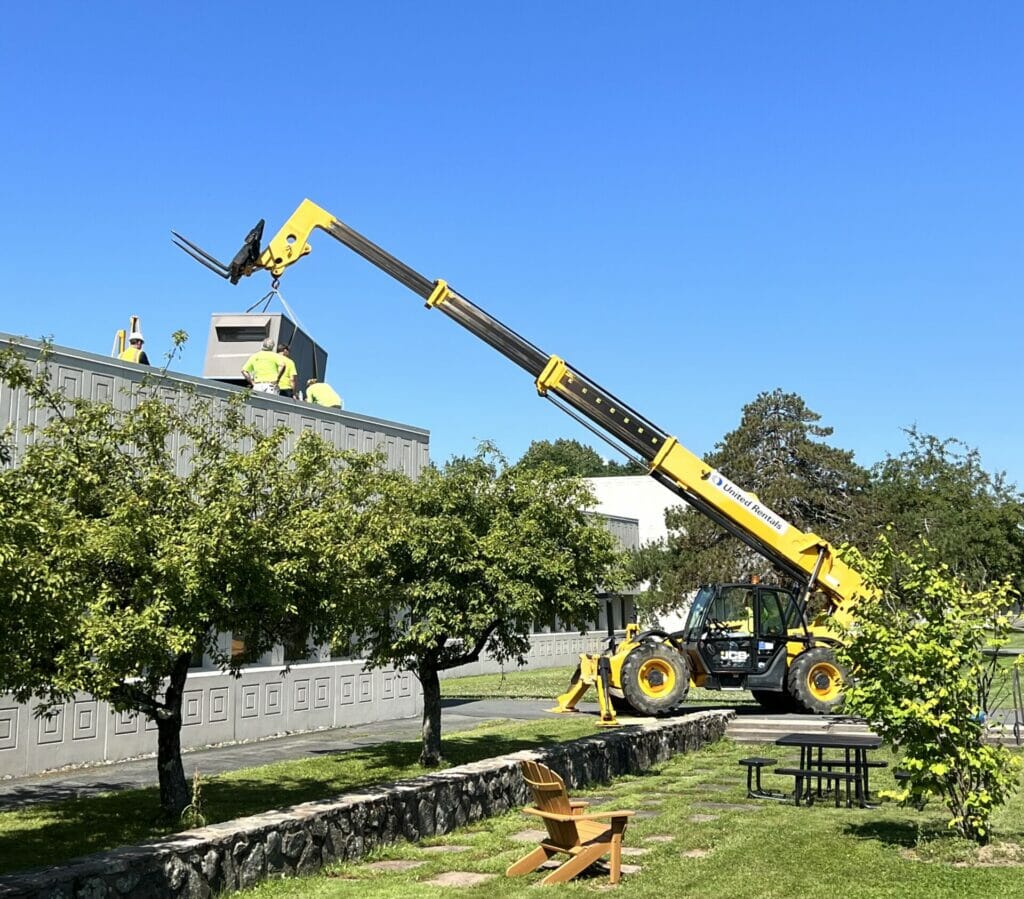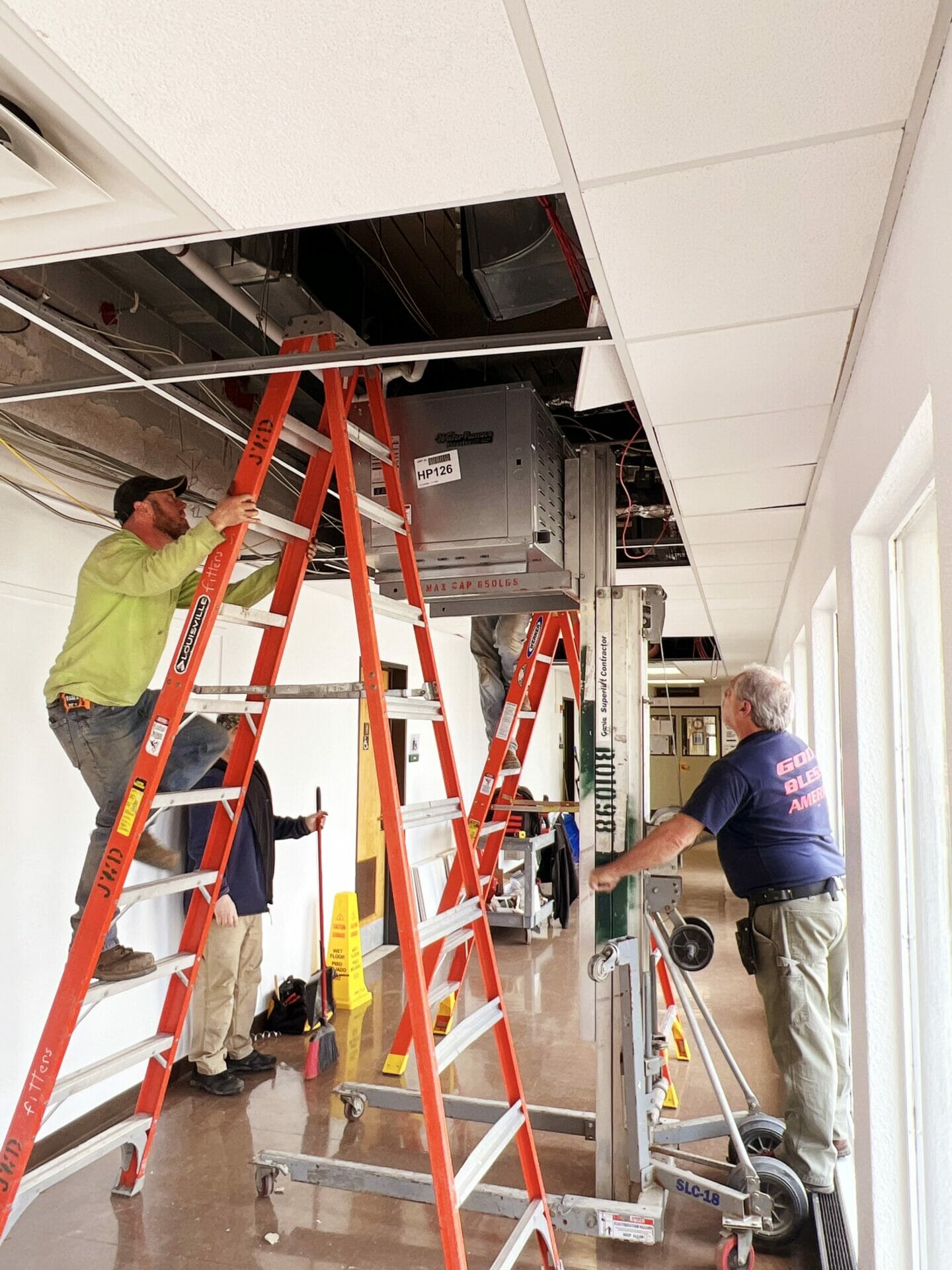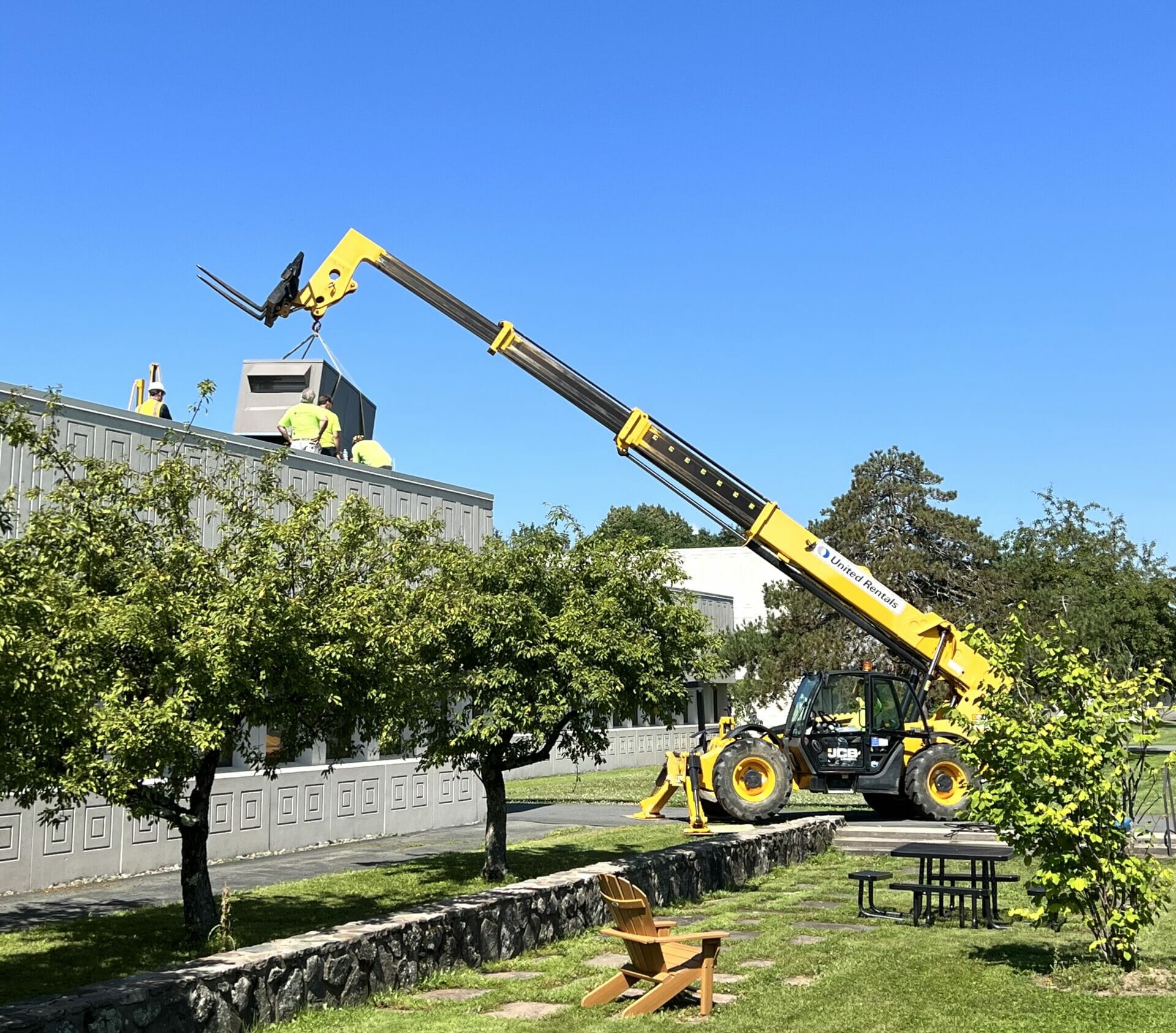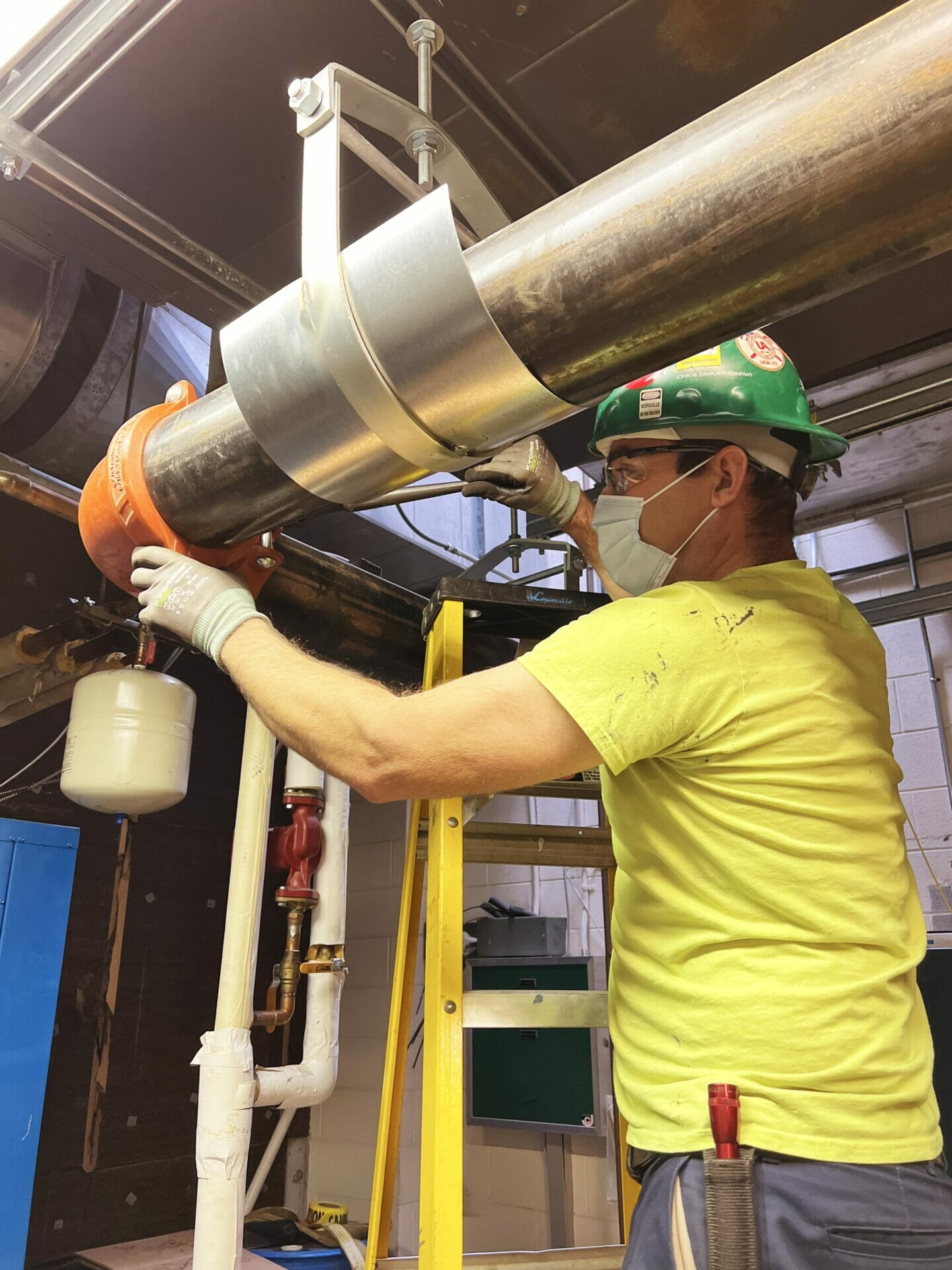Financed Through New York Power Authority, Project Includes Replacing Boilers, Geothermal Heat Pumps, and other HVAC Infrastructure and Installing Energy-Efficient Windows and Lighting

Loch Sheldrake, NY — A longtime leader in sustainability and energy cost savings among New York Higher Education Institutions, SUNY Sullivan is renewing its commitment to sustainability through a $9.8 million energy efficiency and facilities upgrade project that will bring significant cost savings to Sullivan County and cement the College’s status as a model green campus in New York State.
The energy efficiency project—which includes replacing the campus’s failing 22-year-old boilers and 130 geothermal heat pumps, as well as installing high-efficiency windows, LED lighting, and other energy-saving upgrades to campus facilities—is being financed and implemented by the New York Power Authority (NYPA), which will be reimbursed by Sullivan County with matching funding from New York State through SUNY’s Office for Capital Facilities Community College Capital Program.
When complete, the project will result in significant energy and cost savings for Sullivan County, reducing annual greenhouse gas emissions by nearly 400 metric tons and strengthening SUNY Sullivan’s leadership in environmental sustainability and social responsibility in the Catskills and across higher education. The comprehensive upgrades are expected to generate $176,000 in annual energy and maintenance cost-savings. The project also advances the goals laid out in the BuildSmart2025 program, which calls for 11 trillion British thermal units (TBtu) of on-site energy savings in buildings owned by New York State. The energy efficiency improvements also directly support the goals of New York State’s Climate Leadership and Community Protection Act, which calls for greenhouse gas emissions from buildings to be reduced by 40 percent by the year 2030.
“Thanks to visionary leadership and the support of Sullivan County, SUNY Sullivan has been at the forefront of the sustainability movement for more than 20 years,” said SUNY Sullivan President Jay Quaintance. “While cutting edge at the time, the infrastructure has aged and much of the geothermal system and boilers were reaching the end of the designed function life. This project truly brings these systems into the 21st century with improved efficiency, better controls, and further establishes SUNY Sullivan as a leader in sustainability and reliance on renewable energy. Thank you to Rich Butler and Larry Reeger on the college team, the New York State Power Authority, and to the Sullivan County Legislature, Josh Potosek, and Heather Brown and the State of New York for this investment in a greener future for SUNY Sullivan.”
“This was made possible through an innovative use of our American Rescue Plan Act (ARPA) monies along with partnerships with NYPA, the College, and SUNY,” Sullivan County Manager Joshua Potosek. “As a result, we’ve fielded calls from other municipalities interested in duplicating our success. I’m proud to be part of a team that aims to lead the State in smart, cost-effective green energy initiatives. We’re rightfully recognized as one of the ‘greenest’ counties in New York, and this latest effort will help ensure we remain so.”
“I am thrilled that Sullivan County and SUNY Sullivan are able to bring this energy efficiency project to fruition,” said Sullivan County Sustainability Coordinator and Deputy Commissioner of Planning Heather Brown. “Not only does this investment address several critical facility upgrades, but it also seizes an amazing opportunity to build upon the ongoing sustainability movement at the college’s campus. SUNY Sullivan already boasted one of the lowest energy usage intensity ratings across New York State higher education institutions, and this project solidifies its status as a leader in the fast-growing clean energy industry.”
“SUNY Sullivan’s commitment to sustainability is a strong energy efficiency example for other institutions to emulate,” said NYPA Interim President and CEO Justin E. Driscoll. “The comprehensive package of energy-efficient upgrades SUNY Sullivan has implemented will help dramatically shrink the school’s carbon footprint. The SUNY Sullivan improvements will generate $176,000 in annual energy and maintenance cost-savings and simultaneously help safeguard the school’s critical infrastructure.”
SUNY Sullivan became one of SUNY’s first geothermal campuses in 2001 when the College installed its 500-ton geothermal heating and cooling system, which produces an estimated 85 percent of the campus’s heating and cooling needs. In 2015, the College entered into a power purchase agreement with Sullivan Solar Garden, LLC to install a nine-acre, 2.15 MW solar farm on campus that now provides an estimated 75 percent of the College’s electricity, making SUNY Sullivan a model of sustainability and energy cost savings among New York Higher Education Institutions.
In 2020, aware that the College’s four hot water boilers, and many of its geothermal heat pumps were failing, the College commissioned a comprehensive energy audit of the campus, in cooperation with Sullivan County and with the support of the NYPA and the New York State Energy Research and Development Authority (NYSERDA).
“With the support of the Sullivan County Legislatures and County Manager’s office, SUNY Sullivan was able to complete a NYSERDA FlexTech energy audit, which identified and prioritized threats and opportunities to maintain the viability of the overall facilities,” said SUNY Sullivan Associate Professor and Sustainability Coordinator Larry Reeger. “The energy upgrades project will lower the amount of energy used each year, further reduce the college’s carbon footprint, and reduce annual expenditures related to the cost of utilities.”
The energy efficiency project addresses numerous recommendations from that audit, including replacing the four failed or failing hot water boilers with three new high efficiency condensing boilers, as well as replacing 125 failing water-to-air and eight water-to-water heat pumps. Both projects were considered critical to day-to-day operation of the College.
Other energy efficiency improvements being implemented by NYPA, as recommended by the NYSERDA audit, include:
– Upgrading the 20-year-old HVAC control system and variable frequency drives
– Replacing all energy recovery ventilators (ERVs)
– Replacing all fluorescent luminaries with LED equivalents
– Replacing original classroom windows with high-efficiency windows
– Upgrading the Culinary Arts classroom kitchen exhaust system with demand-based variable speed controls
– Replacing the College’s 52-year-old domestic electric resistance water heater with heat pump water heaters
Reeger said the energy project will address the reliability of the College’s heating and cooling system for the next 20 to 40 years and help free up the maintenance staff to address other campus-wide projects.
An initial energy audit by Labella estimated that the project would save the College over $134,000 annually between gas and electricity expenses and an additional $42,000 in annual maintenance costs. While soaring energy prices may skew those estimates, SUNY Sullivan Buildings and Grounds Maintenance Supervisor Rich Butler said the savings impact remains.
“We were paying about $1 per gallon of propane, and now we’re paying about $3 per gallon, so it’s good we’re doing the work because we would be spending much more,” said Butler, who expects savings to increase as LED lighting and high-efficient windows are installed. “I think we’re saving significantly already.”
While supply chain issues have disrupted some aspects of the project, Butler said that contractors have completed installation of the new high-efficiency boilers, water-to water-heat pumps to heat and cool Gerry Field House, energy recovery ventilators (ERVs), as well as 97 percent of the water-to-air heat pumps in common areas and classrooms, and 60 percent of the new LED lighting throughout campus. Upcoming work includes installing the remaining heat pumps and rooftop heat recovery units and replacing all of the campus’s original 52-year-old windows with high-efficient windows.
About Sustainability at SUNY Sullivan
Environmental and social responsibility have long been central to SUNY Sullivan’s mission, informing all aspects of the College’s curriculum, campus operations, and community engagement. Through its innovative Green Building Technology and Environmental Science degree programs, energy-saving campus infrastructure, and unique community partnerships, SUNY Sullivan has become a leader in environmental sustainability in the Catskills and across higher education. The College reaffirmed its commitment to sustainability earlier this year when it signed onto the University Global Coalition, an international group of university leaders that promotes the incorporation of the United Nations’ Sustainable Development Goals (SDGs), into the teaching, research, operations, and partnerships of higher education institutions. For more information on sustainability at SUNY Sullivan, visit sunysullivan.edu/sustainable-sullivan.
About SUNY Sullivan
SUNY Sullivan is the leader of innovative higher education and a catalyst for workforce development throughout the Sullivan Catskills and beyond. Our diverse community cultivates personal growth and professional advancement, preparing students for success in a sustainable and interconnected world. A forward-looking, top-tier community college in New York, SUNY Sullivan offers over 40 degree programs, certificates, and micro-credentials for learners at all levels of their educational goals. We value critical inquiry and creativity while supporting our students in a culture of inclusion
About the SUNY Office for Capital Facilities
The State University of New York Office for Capital Facilities is responsible for providing tools, training and communication to the 64 Campuses within the SUNY System in support of Campus programs for management of facilities. The office provides guidance, oversight and technical expertise regarding the care, custody, control and management of campus facilities in accordance with applicable New York State laws and regulations.
About the SUNY Community College Capital Program
The Office for Capital Facilities Community College Capital Program provides assistance to college budget and facilities staff for capital planning & financing. Additionally, program staff advocate for the SUNY system with NYS Division of the Budget for necessary appropriations and bonding for continued capital project development.
About NYPA
NYPA is the largest state public power organization in the nation, operating 16 generating facilities and more than 1,400 circuit-miles of transmission lines. More than 80 percent of the electricity NYPA produces is clean renewable hydropower. NYPA uses no tax money or state credit. It finances its operations through the sale of bonds and revenues earned in large part through sales of electricity. For more information visit www.nypa.gov and follow us on Twitter, Facebook, Instagram, Tumblr and LinkedIn.
For more information go to sunysullivan.edu.
###
August 18, 2022.



